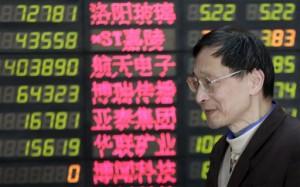
Cypriot banks will open Thursday after being shut for nearly two weeks as an emergency loan was being pieced together to prevent the nation’s financial sector from collapsing. Authorities have been putting measures in place to prevent a rush of euros out of the country’s banks. Cash withdrawals will be limited to 300 euros ($383) per person each day, and no checks will be cashed.
European stocks were mostly lower in early trading. Britain’s FTSE 100 was nearly unchanged at 6,388.95. Germany’s DAX fell almost 0.1 percent to 7,782.21. France’s CAC-40 lost 0.3 percent to 3,699.58.
Wall Street also appeared headed for a day of losses, with Dow Jones industrial futures falling 0.2 percent to 14,424. S&P 500 futures shed 0.2 percent to 1,553.10.
The agreement to bailout Cyprus, reached late Monday with international lenders, gives the country a 10 billion euro ($12.9 billion) bailout but forces losses on depositors with more than 100,000 euros in the country’s two largest banks.
Evan Lucas of IG Markets in Melbourne said the deal has sparked fears it may be repeated in other European nations if they faced similar circumstances. In an email commentary, he said investors saw the deal “as a monster in the shadows for banks in Portugal, Spain and Italy” since it requires depositors, not the public or its tax contributions, to take the pain.
Japan’s Nikkei 225 index tumbled 1.3 percent to 12,335.96. Hong Kong’s Hang Seng lost 0.7 percent to 22,299.63. South Korea’s Kospi was nearly unchanged at 1,993.52. Australia’s S&P/ASX 200 lost 0.6 percent to 4,966.50.
Peter Lai of DBS Vickers Securities in Hong Kong said he was expecting a “disastrous phenomenon” in Cyprus when banks reopen.
“We also expect there’ll be some kind of bank run. So lots of people are trying to get their cash back and this undoubtedly will be some kind of bad impact on the Cyprus banking system and people believe that or they think that this may affect the euro system,” he said.
Meanwhile, in Italy, a leading political party failed in its attempt to form a new government. The stalemate has raised concerns that the country will be unable to manage its deep debts. Italy is the third-largest economy of the 17 countries that use the euro.
Financial stocks across Asia slumped. Japan’s Mizuho Financial Group dropped 2.4 percent. Agricultural Bank of China fell 2.1 percent in Hong Kong.
In Australia, Newcrest Mining plummeted 8.3 percent after the company said its gold production target for the 2012-13 fiscal year would not be reached.
Benchmark oil for May delivery was up 1 cent to $96.59 per barrel in electronic trading on the New York Mercantile Exchange. The contract gained 24 cents to close at a five-week high of $96.58 per barrel on the Nymex on Wednesday.
In currencies, the euro fell to $1.2768 from $1.2774 late Wednesday in New York. The dollar fell to 94.06 yen from 94.38 yen.